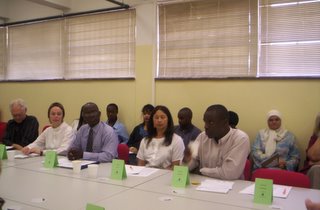This continued liaison resulted in a seminar on Wednesday, 9th of November 2005 at the Centre for Humanities Research, at UWC. Prof George Fredericks welcomed the Finnish delegation and the 30 attendees. The morning was divided into two sessions. First, the Finnish perspective on Information-seeking behaviour and the second, a round table discussion on Knowledge Management Curriculum.
Now if you’re like me, and did not particularly like User studies when you were studying, then ended up in user services, and found that you love being there, then Mariam Ginman’s presentation of several theories on information seeking behaviour from a Finnish perspective based on research, would have captured your imagination. I shall try to give you a taste.
Mariam Ginman presented information seeking behaviour in terms of three current paradigms of human behaviour: cognitive, social and socio-cognitive paradigm. Theories of information behaviour span the whole life cycle of information, from production, to its storage, retrieval and use. However, the focus of the current theories is on the constructive and active user coping with professional and everyday life. Information behaviour is the term now broadly used for how people need, seek and use information.
The cognitive view is based on theories in cognitive psychology. The theories evolved in the mid 70s and theorists such as Belkin and Kuhlthau viewed the information seeking process as context independent. Jannica Heinström studies of 2002 found three distinct groups of personality-related search behaviours. She found that “the neurotic, easily distracted and lazy Fast surfers have difficulties formulating searches and then interpreting what they find. Deep divers are identified by their willingness to consider viewpoints and to link ideas. Broad scanners are strategic thinkers, conscientious and have clear goals.
The social view emerged during the 90s and consider context as a carrier of meaning, in other words information seeking is context dependant. These theories focus on meaning and values associated with social, sociocultural and sociolinguistic aspects on information behaviour. The studies are based on theories from the social sciences. Elfreda Chatman work was presented in some details. Chatman developed the small world theory based on studies she conducted on the information seeking behaviour and life characteristics of poor people. Chatman and Maija-Leena Huotari combined the small world theory with social network theory to explain organizational behaviour.
The socio-cognitive view considers information seeking behaviour as too complex a phenomenon to be approached from only one view. The work of Anthony Giddens and Vygotsky has influenced this view. Studies focus on how cognition interacts with the sociocultural environment. Dervin’s theories evolving from the mid 80s, consider information seeking as a way of making sense of the world in order to cope with everyday life. This model is called the situation-gap-use, where we face a situation in which our internal sense runs out. A knowledge gap is created which has to be bridged by new information. When we use the information we bridge the gap created.
Mariam Ginman concluded her session with the suggestion that information behaviour is part of the communicative process. For the presentation of Mariam Ginman, Director of Research at Abo Akademie University, Finland, see http://www.liasa.org.za/branches/WCape_Seminar_Nov2005_Ginman.ppt
 The second session was a roundtable discussion on Knowledge Management curriculum. Miaja-Leena Huotari, from the Oulu University, Finland, chaired the discussion by several invited guests, representing the library, information systems and technology sector in higher education in the Western Cape. They considered several questions; amongst these were: What is knowledge management? What is the difference between knowledge management and business intelligence? What is the role of culture in knowledge management? Is a librarian a knowledge manager? What does the ideal knowledge management programme look like? As you can imagine there were lots of discussion and healthy debate reflecting really the worldview of the different disciplines represented.
The second session was a roundtable discussion on Knowledge Management curriculum. Miaja-Leena Huotari, from the Oulu University, Finland, chaired the discussion by several invited guests, representing the library, information systems and technology sector in higher education in the Western Cape. They considered several questions; amongst these were: What is knowledge management? What is the difference between knowledge management and business intelligence? What is the role of culture in knowledge management? Is a librarian a knowledge manager? What does the ideal knowledge management programme look like? As you can imagine there were lots of discussion and healthy debate reflecting really the worldview of the different disciplines represented.20 January 2005
No comments:
Post a Comment